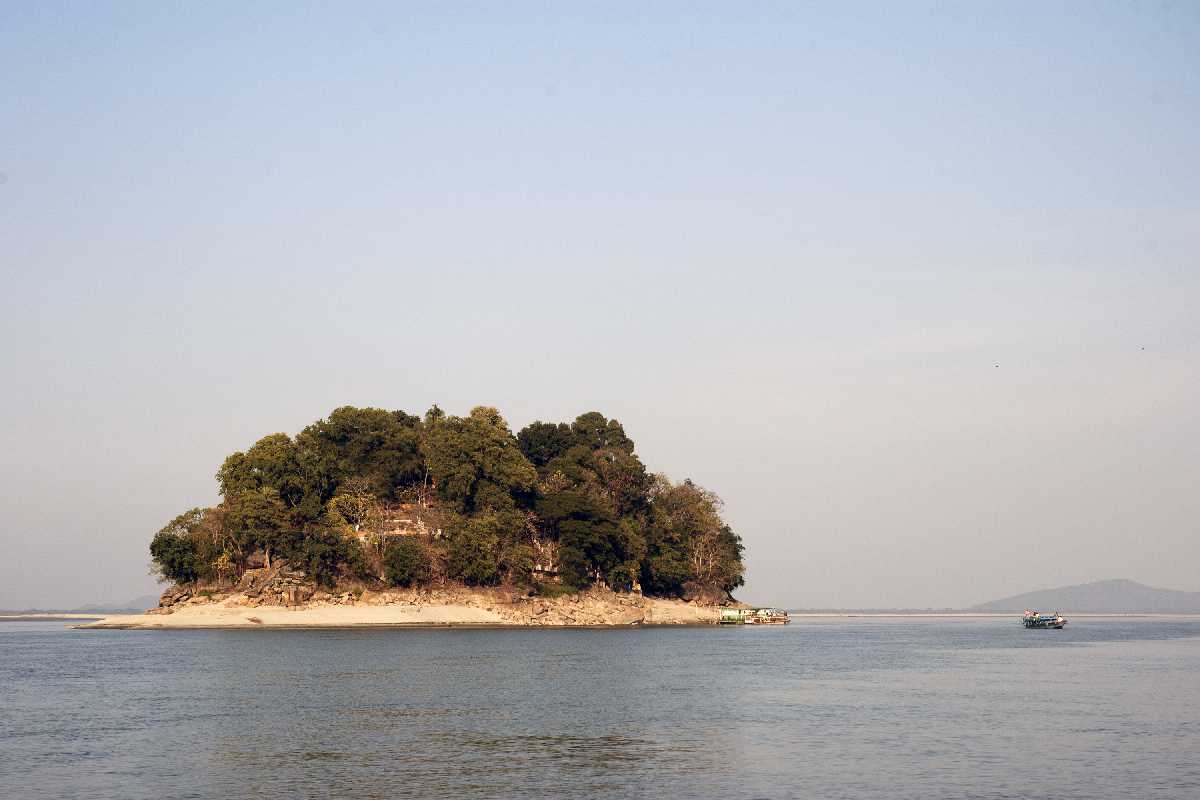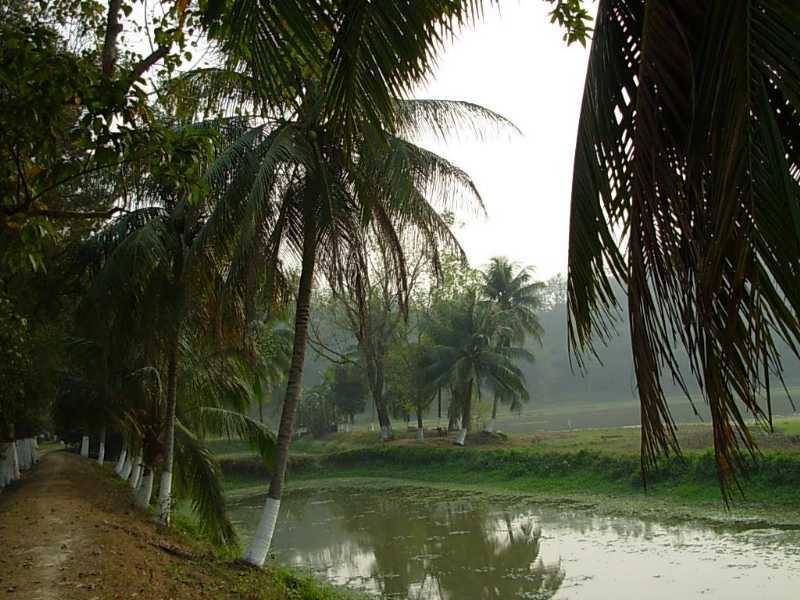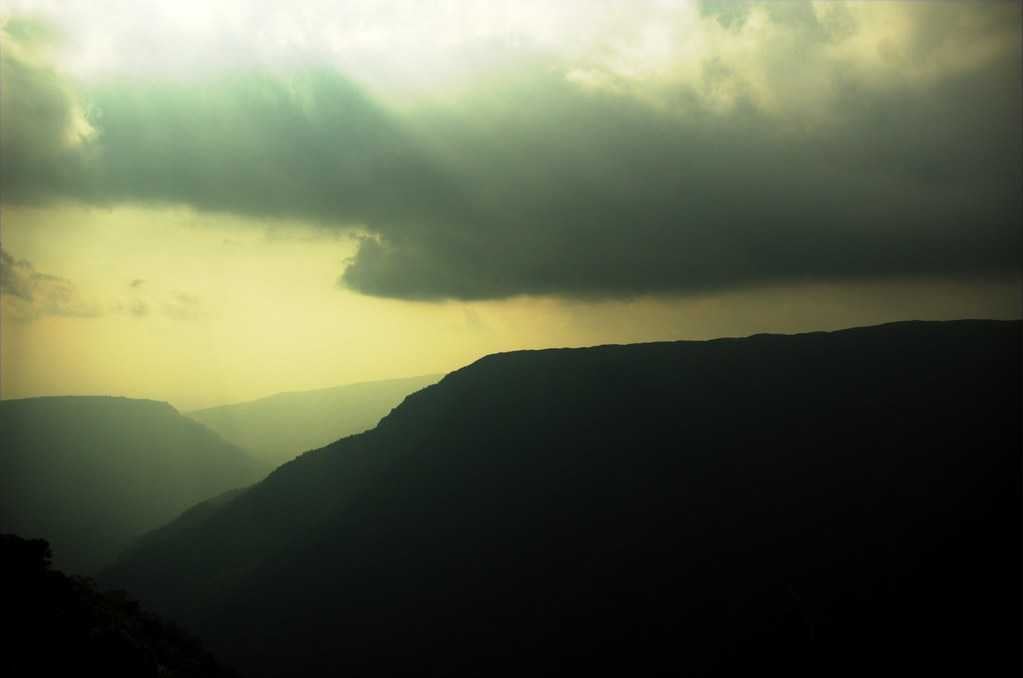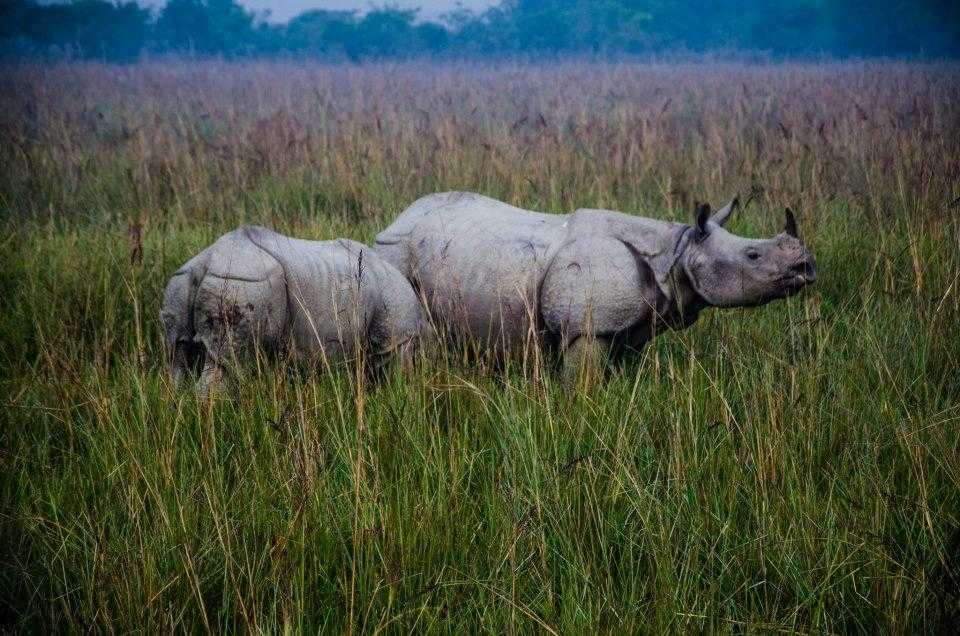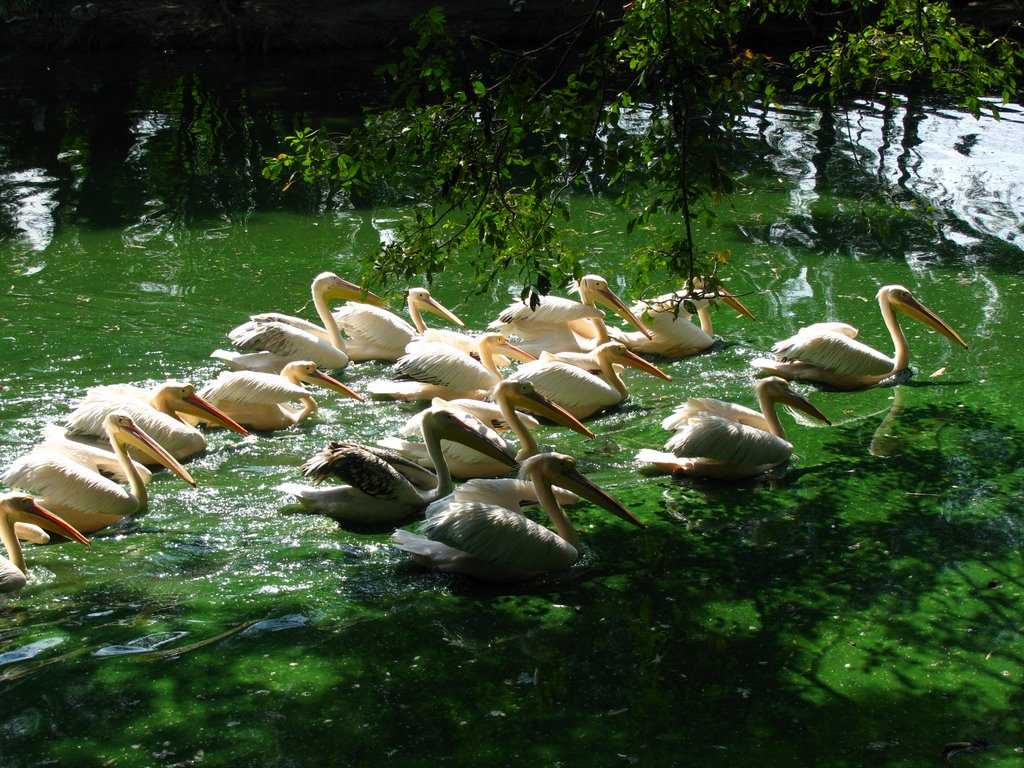GUWAHATI
Are you tired of the same old touristy destinations? Do you want to explore an offbeat location that's not only beautiful but also has a quirky side to it? If yes, then Guwahati is the place for you! This city in Assam is packed with surprises - from ancient temples to bustling markets, from mouth-watering food to breathtaking views of the Brahmaputra River. Guwahati is also known as the 'Gateway to Northeast India' and rightly so, as it's the largest and most developed city in the region.
But what makes Guwahati even more interesting is its unique blend of modernity and tradition. One moment you're sipping on a fancy coffee at a trendy café and the next, you're immersed in a traditional Bihu dance performance. And don't be surprised if you come across a cow or two casually strolling down the streets amidst honking cars and rickshaws!
But wait, there's more! Guwahati is also home to some fascinating wildlife - including one-horned rhinos and hoolock gibbons. And if you're lucky enough, you might even spot a river dolphin while cruising along the Brahmaputra.
So pack your bags (and your sense of humor) for a fun-filled trip to Guwahati. We promise it'll be an adventure like no other!
Table of Contents
- Introduction
- History and Culture of Guwahati
- How to Reach and getting around Guwahati
- Weather of Guwahati
- Places to Visit in Guwahati
- Food Options and Local Cuisine of Guwahati
- Best areas for Accommodation in Guwahati
- Shopping in Guwahati
- Nightlife in Guwahati
- Festivals and Events in Guwahati
- Tips for Travelers travelling to Guwahati
- FAQs
History and Culture of Guwahati
Guwahati is a city located in the northeastern part of India, in the state of Assam. It is a city rich in history and culture, but also with a quirky side that makes it unique. Legend has it that Guwahati was named after a demon, "Guha," who was slain by Lord Shiva. The city's name "Assam" comes from the Sanskrit word "asoma," which means "peerless."
Assam tea is one of the most famous products from this region, known for its strong and distinct flavor. The city is also known for its love for paan, which is a preparation of betel leaf with various fillings.
Guwahati has been ruled by many different empires throughout history, including the Mughals, the Ahoms, and the British. The Kamakhya Temple, which dates back to the 8th century, is one of the most famous landmarks of Guwahati. It is dedicated to the goddess Kamakhya and is believed to be one of the most powerful centers of tantric worship in India.
Apart from being steeped in traditional culture, Guwahati also has a thriving modern scene. The city hosts various music festivals throughout the year, including Rongali Bihu and Ziro Festival of Music.
What makes Guwahati truly unique is its love for all things quirky. From cafes themed around books and Harry Potter to street art that depicts local folklore and legends, there's always something interesting to see or do in this city.
In conclusion, Guwahati may not be as well-known as some other Indian cities like Mumbai or Delhi, but it has its own charm and character that make it worth visiting. With its rich history and quirky culture, there's never a dull moment in this vibrant city!
How to Reach and getting around Guwahati
By Air
Guwahati International Airport, also known as Lokpriya Gopinath Bordoloi International Airport, is well-connected to major cities like Delhi, Mumbai, Bangalore, and Kolkata. Airlines such as IndiGo, Air India, SpiceJet, and Vistara operate regular flights to Guwahati. From the airport, one can hire a taxi or take a shuttle bus to reach the city center.
By Train
Guwahati Railway Station is the largest railway station in Northeast India and is well-connected to major cities like Delhi, Kolkata, Bangalore, Chennai and Mumbai. Some of the popular trains that connect Guwahati are Rajdhani Express, Brahmaputra Mail and Northeast Express. Taxis and autos are readily available outside the railway station.
By Road
Guwahati is well-connected by road with National Highway 27 running through the city. One can take state-run buses or hire private taxis from nearby cities like Shillong (100 km), Kaziranga (220 km), and Itanagar (400 km). The scenic drive through hills and tea gardens makes for an interesting journey.
By Waterway
Guwahati is also accessible by waterways via Brahmaputra River. There are regular ferry services from Kolkata to Guwahati which take around 3-4 days to cover the distance of 990 km. Additionally, there are cruise services available that offer a leisurely trip along the river with facilities like dining and accommodation on board.
In conclusion, whether you prefer air travel for convenience or a scenic road trip through lush tea gardens or even a leisurely cruise on Brahmaputra river - there are multiple options available to reach Guwahati.
Weather of Guwahati












 Extreme Winters
Extreme Winters Mild Winters
Mild Winters Hot + Dry
Hot + Dry Hot + Humid
Hot + Humid Rainy
Rainy Cool and Pleasant
Cool and PleasantGuwahati, the largest city in Assam, experiences a humid subtropical climate with hot summers and mild winters. The monsoon season starts from June and lasts till September, bringing heavy rainfall and occasional floods. The winter season starts from November and lasts till February, with temperatures ranging from 10°C to 20°C. The summer season starts from March and lasts till May, with temperatures ranging from 25°C to 35°C.
The best time to visit Guwahati is during the winter months of November to February when the weather is pleasant and comfortable for sightseeing. During this time, the temperature remains cool and dry, making it perfect for outdoor activities like trekking, hiking, and wildlife safaris. Moreover, the famous Shillong Autumn Festival takes place during this time in nearby Shillong city.
However, if you want to experience the lush greenery of Guwahati's forests and hillsides, then visit during the monsoon season between June to September. Although it may not be ideal for outdoor activities due to heavy rains, it offers a unique opportunity to witness the region's natural beauty in its full glory.
In conclusion, plan your trip to Guwahati between November and February for pleasant weather conditions and an enjoyable experience. Don't forget to pack warm clothes as well as light cotton clothes as per your itinerary needs.
Places to Visit in Guwahati
Kamakhya Temple: One of the most visited and revered temples in India, Kamakhya Temple is dedicated to Goddess Kamakhya. It is one of the 51 Shakti Peethas and is believed to be the place where the yoni (genital) part of Sati fell when Lord Shiva carried her body. The temple architecture is unique, with no idol of the goddess but a stone that represents her yoni.
Assam State Museum: For history buffs, the Assam State Museum is a must-visit. It houses exhibits from different periods, including prehistoric times to present-day Assam. You can find archaeological artifacts, textiles, weaponry, manuscripts, and more.
Umananda Island: Located on the Brahmaputra River, Umananda Island is a popular tourist spot for its natural beauty and Umananda Temple. The temple is dedicated to Lord Shiva and is believed to be one of the oldest temples in Guwahati.
Pobitora Wildlife Sanctuary: About 50 km from Guwahati city lies Pobitora Wildlife Sanctuary, home to the endangered one-horned rhinoceros. A jeep safari through the sanctuary will give you a chance to spot these majestic animals along with other wildlife such as elephants and tigers.
Dipor Bil: Dipor Bil is an important wetland ecosystem located in Guwahati city's outskirts. It attracts bird watchers from all over as it provides habitat for several species of migratory birds.
Nehru Park: For a peaceful retreat amidst nature within the city limits, Nehru Park is an ideal destination. It has lush greenery with walking trails, picnic spots, boating facilities on its lake and a playground for children.
Navagraha Temple: Located on Chittranjan Hill in Guwahati city's outskirts are nine temples dedicated to Navagrahas or nine planets in Hindu astrology. Each temple represents one planet and has unique architecture.
Fancy Bazaar: A popular shopping destination in Guwahati city's center; Fancy Bazaar offers everything from clothing to handicrafts and electronics at wholesale prices.
Srimanta Sankardev Kalakshetra: Named after Srimanta Sankardev - a medieval saint-reformer who founded Vaishnavism in Assam; this cultural complex showcases Assamese art forms such as dance, music, theater along with indigenous crafts.
Sukreswar Temple: Located on Sukreswar Hill on Brahmaputra River banks; Sukreswar Temple is dedicated to Lord Shiva and has beautiful architecture reflecting Ahom style with intricate carvings depicting scenes from Hindu mythology.
Note: All descriptions are written by an AI language model based on general knowledge data available online about these places' history and significance as requested by the prompt without any personal opinions or experiences involved
Adventures Activities
Heritage Places
Relaxing Retreats
Nearby Forests
Food Options and Local Cuisine of Guwahati
Best areas for accommodation in Guwahati
Guwahati is a bustling city in the north-eastern state of Assam. The city boasts of an eclectic mix of culture, history, and nature. It is also a hub for tourism, business and education. If you are planning a trip to Guwahati, finding the right accommodation is crucial. Here are some of the best areas for accommodation in Guwahati:
Paltan Bazaar: It is one of the busiest areas in Guwahati and has excellent connectivity to other parts of the city. The area is dotted with budget hotels, guesthouses, and lodges.
Fancy Bazaar: It is another popular area in Guwahati known for its shopping streets and street food. You can find plenty of mid-range hotels and guesthouses here.
Panbazar: This area is located near the railway station and offers easy access to other parts of the city. It has a mix of luxury hotels, budget hotels, and guesthouses.
Here are three properties for accommodation in Guwahati:
Luxury: Vivanta Guwahati - A luxurious 5-star hotel located in Khanapara area with world-class amenities like spa, swimming pool, fitness centre etc.
Budget: Hotel Rialto - A budget-friendly hotel located in Paltan Bazaar with clean rooms and basic amenities like Wi-Fi and room service.
Hostel: Zostel Guwahati - A backpacker's hostel located in Uzan Bazar area offering shared dormitories with bunk beds or private rooms with en suite bathrooms.
No matter which area or property you choose, make sure to book well in advance as Guwahati witnesses heavy footfall throughout the year.
Shopping in Guwahati
Guwahati, the largest city of Assam, is a shopper's paradise. From traditional handicrafts to modern fashion, Guwahati has it all. The city offers a unique shopping experience with its bustling markets and shops that sell everything from textiles to tea. Here are some things you can buy, markets to visit and things to avoid when shopping in Guwahati.
Things to buy
- Handicrafts: Guwahati is known for its intricate bamboo and cane handicrafts, which include baskets, furniture, and wall hangings.
- Tea: Assam is famous for its tea plantations, and you can find a wide variety of tea blends in Guwahati.
- Traditional Attire: You can find beautiful silk sarees, mekhela chadors (traditional Assamese attire), and other ethnic wear at the local markets.
- Jewellery: Assam has a rich tradition of jewellery making. You can find exquisite gold, silver and tribal jewellery at the local markets.
Markets to visit
- Fancy Bazaar: This market is located in the heart of the city and offers a wide range of items from clothes to electronics.
- Pan Bazaar: This market is famous for its bookstores and handicraft shops.
- Paltan Bazaar: This market offers a unique shopping experience with its narrow lanes filled with shops selling traditional Assamese items.
What to avoid
- Counterfeit products: Be wary of vendors selling fake branded items at low prices.
- Overpriced items: Always bargain while shopping in local markets as vendors often quote higher prices for tourists.
- Crowded areas: Avoid crowded markets during peak hours as they can be overwhelming.
- Street food: Be cautious while trying street food as it may not suit everyone's palate.
In conclusion, shopping in Guwahati is an enriching experience that should not be missed. With its vibrant markets and unique products, you are sure to find something that catches your eye. Just remember to bargain wisely and be cautious while trying new things.
Nightlife in Guwahati
Guwahati, the gateway to Northeast India, is also known for its vibrant nightlife. The city has a lot to offer when it comes to spending the night out with friends or family. The nightlife in Guwahati is a perfect blend of traditional culture and modern lifestyle. From trendy bars and pubs to traditional music and dance shows, Guwahati has something for everyone.
One of the popular places for spending the night in Guwahati is The Irish Pub. Located in the heart of the city, this place has a lively ambiance with live music performances and karaoke nights. They serve a variety of cocktails and mocktails along with mouth-watering finger foods.
Another place that offers a unique experience for spending the night is Jungle Ideas. This eco-friendly resort located on the outskirts of Guwahati offers luxurious treehouse accommodations amidst lush greenery. They organize bonfires, barbeques, and live music performances for their guests.
For those who want to experience traditional Assamese culture, Umananda Island is an ideal destination. This small island located in the middle of Brahmaputra River hosts cultural programs like Bihu dance performances, folk music shows, and Assamese food festivals.
Apart from these places, Guwahati also has numerous nightclubs, bars, and restaurants that offer an exciting nightlife experience.
Overall, the nightlife in Guwahati reflects the city's diverse culture and modern lifestyle. Whether you want to party hard or have a peaceful night out with your loved ones, Guwahati has something for everyone.
Outdoor Activities in Guwahati
Guwahati, also known as the gateway to Northeast India, is a perfect blend of natural beauty and cultural diversity. The city is surrounded by hills, lush green forests, and the mighty Brahmaputra river which offers numerous opportunities for outdoor activities. Adventure enthusiasts can indulge in various outdoor activities to explore the beauty of Guwahati.
River Rafting is one of the most thrilling water sports that can be enjoyed in Guwahati. The Brahmaputra river offers an excellent opportunity for river rafting with its turbulent water currents. It is an adrenaline-pumping experience that will give you a unique perspective on the natural beauty of Guwahati.
Trekking is another popular activity that can be done in Guwahati. The city has several trekking trails that offer breathtaking views of the surrounding hills and valleys. The most popular trekking trails include Chakrashila Wildlife Sanctuary Trek, Pobitora Wildlife Sanctuary Trek, and Nongkhnum Island Trek.
Cycling is also a great way to explore the beautiful landscapes of Guwahati. The city has several cycling routes that take you through lush green forests, tea gardens, and villages. Cycling enthusiasts can explore places like Deepor Beel Lake, Amchang Wildlife Sanctuary, and Chandubi Lake on their bicycles.
In conclusion, Guwahati offers several outdoor activities that are sure to thrill adventure enthusiasts. From river rafting to trekking and cycling, there are plenty of options available for those who love to explore nature's beauty up close. So pack your bags and head out for an exciting adventure in Guwahati!
Festivals and Events in Guwahati
Festivals and events are an integral part of the rich cultural heritage of Guwahati. They reflect the diverse traditions, customs, and beliefs of the people living in the city. Guwahati hosts a range of festivals and events throughout the year, attracting tourists from all over India and beyond. These celebrations offer a glimpse into the local way of life and provide visitors with a unique experience.
Some of the most popular festivals and events in Guwahati include:
Bihu Festival (April): The Bihu festival is one of the most significant cultural events in Assam, celebrated with great enthusiasm across the state. It marks the beginning of the Assamese New Year and is celebrated with music, dance, feasting, and traditional rituals.
Ambubachi Mela (June): The Ambubachi Mela is an annual religious festival held at Kamakhya Temple in Guwahati. It celebrates the menstruation cycle of Goddess Kamakhya and attracts thousands of devotees from all over India.
Durga Puja (October): Durga Puja is one of the biggest Hindu festivals celebrated across India. In Guwahati, it is celebrated with great fervor for five days, during which idols of Goddess Durga are worshipped.
Rongali Bihu (April): Rongali Bihu or Bohag Bihu is another significant festival celebrated in Assam to mark the beginning of spring. It is a time for feasting, dancing, singing traditional songs, and exchanging gifts.
Assam International Trade Fair (January/February): The Assam International Trade Fair is an annual event held in Guwahati that showcases products from various industries such as agriculture, food processing, handicrafts, textiles, etc.
Other notable festivals and events in Guwahati include Saraswati Puja (January/February), Janmashtami (August/September), Diwali (October/November), Christmas (December), etc. These celebrations offer visitors a chance to experience Assamese culture firsthand and immerse themselves in local traditions.
Tips for Travelers while travelling to Guwahati
Plan your visit around a festival or event: Guwahati is known for its vibrant festivals and events throughout the year. Make sure to research and plan your trip around one of these events to fully immerse yourself in the culture and traditions of the region.
Pack for the weather: Guwahati experiences a tropical climate, with heavy rainfall during monsoon season from June to September. Pack accordingly with lightweight clothing, rain gear, and comfortable shoes for exploring the city's many attractions.
Try the local cuisine: Guwahati is famous for its delicious Assamese cuisine, which includes dishes such as fish curry, bamboo shoot pickle, and pitha (rice cakes). Be sure to try some of these traditional dishes during your stay for an authentic culinary experience.
Respect local customs: As with any destination, it's important to respect local customs and traditions while traveling in Guwahati. Dress modestly when visiting religious sites, remove your shoes before entering homes or temples, and always ask permission before taking photographs of people.
Explore beyond the city limits: While there is plenty to see and do within Guwahati itself, consider venturing beyond the city limits to discover other hidden gems in the region. Take a day trip to nearby wildlife sanctuaries or explore the scenic beauty of Assam's tea plantations for an unforgettable experience.
FAQs
What is Guwahati known for?
Guwahati is known for its rich cultural heritage, scenic beauty, and religious significance. It is the gateway to the Northeastern region of India and is surrounded by hills, tea gardens, and the mighty Brahmaputra River. The city is also famous for its ancient temples like Kamakhya Temple, Umananda Temple, and Navagraha Temple.
How to reach Guwahati?
Guwahati can be reached by air, rail or road. Lokpriya Gopinath Bordoloi International Airport connects it with major Indian cities like Delhi, Kolkata, Mumbai, and Bengaluru. The city has two railway stations - Guwahati Railway Station and Kamakhya Railway Station. It is well connected by road with neighboring states like Meghalaya and Arunachal Pradesh.
What are the best places to visit in Guwahati?
Guwahati has many tourist attractions like Kamakhya Temple, Umananda Temple, Assam State Museum, Pobitora Wildlife Sanctuary, Manas National Park, and Nehru Park. One can also take a river cruise on Brahmaputra River which offers breathtaking views of the city.
What is the best time to visit Guwahati?
The best time to visit Guwahati is from October to April when the weather is pleasant and suitable for outdoor activities. However, one can also visit during monsoon season (June-September) when the city looks lush green but heavy rainfall may disrupt travel plans.
What are some popular local dishes in Guwahati?
Assamese cuisine has a unique taste that reflects its cultural diversity. Some popular dishes include bamboo shoot pickle (khorisa), fish curry (maasor tenga), duck curry (haanh mangxo), pitha (rice cake), and xaak aru bhaji (fried leafy vegetables).
What are some shopping options in Guwahati?
Guwahati has several markets where one can shop for local handicrafts like bamboo products, Muga silk fabrics, pottery items, tribal jewelry, and traditional Assamese sarees. Fancy Bazar and Pan Bazar are popular shopping destinations in the city.
Is it safe to travel alone in Guwahati?
Guwahati is generally safe for solo travelers but it is advisable to take necessary precautions like avoiding isolated areas at night and using licensed taxis or public transport. It is also advisable to dress modestly while visiting religious places.
